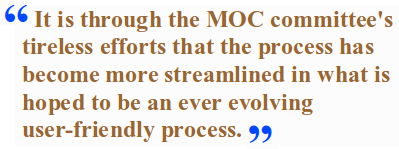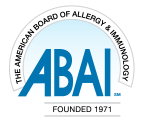Notes from the Chair: John Oppenheimer, MD
ABAI: Striving to Make the MOC Process More Accessible
by John Oppenheimer, MD

The Maintenance of Certification (MOC) process is a professional response attempting to ensure physician accountability and transparency in the assessment of their professional development and education. To do so, the American Board of Allergy and Immunology (ABAI) relies upon the six core competencies developed by the American Board of Medical Specialties (ABMS) and the Accreditation Council for Graduate Medical Education (ACGME) which has been promoted through public pressure for accountability and credibility. These six core competencies include: patient care and procedural skills, medical knowledge, practice-based learning and improvement, interpersonal and communication skills, professionalism and systems-based practice. Since 1977 the ABAI has offered a recertification process. Although, initially a voluntary exercise, in 1989 the ABAI began issuing only time-limited certificates requiring MOC every 10 years. At first, our parent boards solely required taking a secure exam every 10 years to fulfill this commitment. Over time however, this program has evolved to require a continuous educational process. Currently, the ABAI has 5,480 diplomates. Of these, 2,297 (41.9%) have time-unlimited certificates (TUC) and 3,183 (58.1%) have time-limited certificates (TLC). To date, 48.2% of all diplomates
 are meeting MOC requirements. Of the diplomates holding a TLC, 67.3% are meeting MOC requirements while 21.8% of diplomates holding a TUC are meeting MOC requirements.
are meeting MOC requirements. Of the diplomates holding a TLC, 67.3% are meeting MOC requirements while 21.8% of diplomates holding a TUC are meeting MOC requirements.
To achieve this, the ABAI has implemented four components in the MOC process. These include: Part I Professional Standing, which includes medical licensure, updating demographic information, and an annual MOC fee; Part II which includes CME credits, a patient safety module once every 10 years, a communication module once every 10 years and a Recent Advances (RA) module once every five years; Part III is the secure exam and Part IV is one practice assessment/quality improvement module every five years. These components can seem somewhat overwhelming; however we are striving to make the process more accessible. This includes our recent revamping of the RA module, with the hope of it someday being integrated into our society's annual meetings. Likewise in the future, it is hoped that the Part IV component will be integrated into your electronic health record (EHR) program.
Orchestrating this process has been very labor intensive. To accomplish this task, the ABAI has developed an MOC committee, chaired by John James, MD. As a private practitioner, he is very cognizant of the constraints facing the practicing allergist. It is through the MOC committee's tireless efforts that the process has become more streamlined in what is hoped to be an ever evolving user-friendly process. As an example, diplomates will have a greater number of topic choices when completing a
 practice assessment/quality improvement module for MOC part IV. The newest module which is currently available for Part IV credit is the PI Pro: Food Allergy PIM. Dr. James will be transitioning off the ABAI Board of Directors in 2014 and his position will be filled by another practicing allergist, Stuart Abramson, MD.
practice assessment/quality improvement module for MOC part IV. The newest module which is currently available for Part IV credit is the PI Pro: Food Allergy PIM. Dr. James will be transitioning off the ABAI Board of Directors in 2014 and his position will be filled by another practicing allergist, Stuart Abramson, MD.
We at the ABAI continue to strive to improve the MOC process and encourage our diplomates to write or email the ABAI office with any suggestions to improve upon the process.

